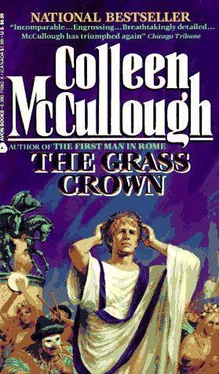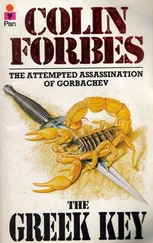Colleen McCullough - 2. The Grass Crown
Здесь есть возможность читать онлайн «Colleen McCullough - 2. The Grass Crown» весь текст электронной книги совершенно бесплатно (целиком полную версию без сокращений). В некоторых случаях можно слушать аудио, скачать через торрент в формате fb2 и присутствует краткое содержание. Жанр: Современная проза. Описание произведения, (предисловие) а так же отзывы посетителей доступны на портале библиотеки ЛибКат.
- Название:2. The Grass Crown
- Автор:
- Жанр:
- Год:неизвестен
- ISBN:нет данных
- Рейтинг книги:5 / 5. Голосов: 1
-
Избранное:Добавить в избранное
- Отзывы:
-
Ваша оценка:
- 100
- 1
- 2
- 3
- 4
- 5
2. The Grass Crown: краткое содержание, описание и аннотация
Предлагаем к чтению аннотацию, описание, краткое содержание или предисловие (зависит от того, что написал сам автор книги «2. The Grass Crown»). Если вы не нашли необходимую информацию о книге — напишите в комментариях, мы постараемся отыскать её.
2. The Grass Crown — читать онлайн бесплатно полную книгу (весь текст) целиком
Ниже представлен текст книги, разбитый по страницам. Система сохранения места последней прочитанной страницы, позволяет с удобством читать онлайн бесплатно книгу «2. The Grass Crown», без необходимости каждый раз заново искать на чём Вы остановились. Поставьте закладку, и сможете в любой момент перейти на страницу, на которой закончили чтение.
Интервал:
Закладка:
3
From none of his friends and from none of the leaders of the Senate did Sulla encounter I" opposition except, that is, from the junior consul. Quintus Pompeius Rufus just kept getting more and more depressed, and ended in saying flatly that he could not countenance the execution of men like Gaius Marius and Publius Sulpicius. Knowing that he had no intention of executing Marius though Sulpicius would have to go Sulla tried at first to jolly Pompeius Rufus out of his megrims. When that didn't work, he harped upon the death of young Quintus Pompeius at the hands of Sulpicius's mob. But the harder Sulla talked, the more obstinate Pompeius Rufus became. It was vital to Sulla that no one see a rift in the concord of those in power and so busily legislating the tribal assemblies out of existence. Therefore, he decided, Pompeius Rufus would have to be removed from Rome and from the sight of those soldiers who so offended his fragile sensitivities. One of the most fascinating changes at work within Sulla concerned this new exposure to supreme power; it was a change he recognized for what it was, and relished it, cherished it. Namely, that he was able to find more satisfaction and release from inner torment by enacting laws to ruin people than ever in the days when he had had to resort to murder. To manipulate the State into ruining Gaius Marius was infinitely more enjoyable than administering a dose of the slowest poison to Gaius Marius, better even than holding Gaius Marius's hand while he died; this new aspect of statecraft set Sulla on a different plane, shot him up into heights so rarefied and exclusive that he could feel himself looking a long way down at the frantic gyrations of his puppets, a god upon Olympus, as free from moral as from ethical restraints. And so he set out to dispose of Quintus Pompeius Rufus in a completely new and subtle way, a way which exercised his mental faculties and spared him a great deal of anxiety. Why run the risk of getting caught murdering when it was possible to have other people murder on your behalf? "My dear Quintus Pompeius, you need a spell in the field," said Sulla to his junior colleague with great earnestness and warmth. "It has not escaped me that ever since the death of our dear boy you've been morose, too easily upset. You've lost your ability to be detached, to see the enormity of the design we weave upon the loom of government. The smallest things cast you down! But I don't think a holiday is the answer. What you need is a spell of hard work." The rather faded eyes rested upon Sulla's face with a huge and genuine affection; how could he not be grateful that his term as consul had allied him to one of history's outstanding men? Who could have guessed it in the days when their alliance had been formed? "I know you're right, Lucius Cornelius," he said. "Probably about everything. But it's very hard for me to reconcile myself to what has happened. And is still happening. If you feel there is some job I can do usefully, I'd be very glad to do it." "There's one extremely important thing you can do a job only the consul can succeed in doing," said Sulla eagerly. "What?" "You can relieve Pompey Strabo of his command." An unpleasant shiver attacked the junior consul, who now looked at Sulla apprehensively. "But I don't think Pompey Strabo wants to lose his command any more than you did!" "On the contrary, my dear Quintus Pompeius. I had a letter from him the other day. In it he asked if it could be arranged that he be relieved of his command. And he specifically asked that his relief be you. Fellow Picentine and all the rest of it you know! His troops don't like generals who aren't Picentines," said Sulla, watching the gladness spread over the junior consul's face. "Your chief job will be to see to their discharge, actually. All resistance in the north is at an end, there's no further need for an army up there, and certainly Rome can't afford to continue paying for one." Sulla adopted a serious mien. "This is not a sinecure I'm offering you, Quintus Pompeius. I know why Pompey Strabo wants to be replaced all of a sudden. He doesn't want the odium of discharging his men. So let another Pompeius do it!" "That I don't mind, Lucius Cornelius." Pompeius Rufus squared his shoulders. "I'd be grateful for the work." The Senate issued a senatus consultum the next day to the effect that Gnaeus Pompeius Strabo was to be relieved of his command and replaced by Quintus Pompeius Rufus. Whereupon Quintus Pompeius Rufus left Rome immediately, secure in the knowledge that none of the condemned fugitives had yet been apprehended; he would not be contaminated by the foulness of it after all. "You may as well act as your own courier," said Sulla, handing him the Senate's order. "Just do me one favor, Quintus Pompeius before you give Pompey Strabo the Senate's document, give him this letter from me and ask him to read it first." Since Pompey Strabo at that time was in Umbria in the company of his own legions and encamped outside Ariminum, the junior consul traveled on the Via Flaminia, the great north road which crossed the watershed of the Apennines between Assisium and Cales. Though it was not yet winter, the weather at those heights was freezingly cold, so Pompeius Rufus journeyed warmly inside a closed carpentum, and with sufficient luggage to fill a mule-drawn cart. As he knew he was going to a military posting, his only escorts were his lictors and a party of his own slaves. As the Via Flaminia was one of the roads home, he had no need to avail himself of hostelries along the way. He knew all the owners of large houses en route, and stayed with them. In Assisium his host, an old acquaintance, was obliged to apologize for the standard of accommodation he offered. "Times have changed, Quintus Pompeius!" he sighed. "I have had to sell so much! And then as if I didn't already have too many troubles! I am invaded by a plague of mice!" Thus Quintus Pompeius Rufus went to bed in a room he remembered as being more richly furnished than it now was, and colder than of yore due to the pillaging of its window shutters by a passing army in need of firewood. For a long time he lay sleepless listening to the scurryings and squeakings, thinking of what was going on in Rome and full of fear because he couldn't help but feel Lucius Cornelius had gone too far. Far too far. There was going to be a reckoning. Too many generations of tribunes of the plebs had strutted up and down the Forum Romanum for the Plebs to lie down under this insult Sulla was offering them. The moment the senior consul was safely abroad all his laws would tumble. And men like himself, Quintus Pompeius Rufus, would bear the blame and the prosecutions. His breath clouding the icy air, he got up at dawn and sought his clothes, shivering, teeth chattering. A pair of breeches to cover himself from waist to knees, a long-sleeved warm shirt he could tuck inside the breeches, two warm tunics over the top of that; and two tubes of greasy wool, nether ends sealed, to cover his feet and his legs up to the knees. But when he picked up his socks and sat on the edge of the bed to draw them on, he discovered that during the night the mice had eaten the richly smelly nether ends of the socks completely away. Flesh crawling, he held them up to the grey light of the unshuttered window and gazed at them sightlessly, filled with horror. For he was a superstitious Picentine, he knew what this meant. Mice were the harbingers of death, and mice had eaten off his feet. He would fall. He would die. It was a prophecy. His body servant found him another pair of socks and knelt to smooth them up over Pompeius Rufus's legs, alarmed at the still and voiceless effigy sitting on the edge of the bed. The man understood the omen well, prayed it was untrue. "Domine, it is nothing to worry about," he said. "I am going to die," said Pompeius Rufus. "Nonsense!" said the slave heartily, helping his master to his feet. "I’m the Greek! I know more about the gods of the Underworld than any Roman! Apollo Smintheus is a god of life and light and healing, yet mice are sacred to him! No, I think the omen means you will heal the north of its troubles." "It means I will die," said Pompeius Rufus, and from that interpretation he would not be budged. He rode into Pompey Strabo's camp three days later more or less reconciled to his fate, and found his remote cousin living in some state in a big farmhouse. "Well, this is a surprise!" said Pompey Strabo genially, holding out his right hand. "Come in, come in!" "I have two letters with me," said Pompeius Rufus, sitting in a chair and accepting the best wine he had sampled since leaving Rome. He extended the little rolls of paper. "Lucius Cornelius asked if you would read his letter first. The other is from the Senate." A change came over Pompey Strabo the moment the junior consul mentioned the Senate, but he said nothing, nor produced an expression which might have illuminated his feelings. He broke Sulla's seal.
Читать дальшеИнтервал:
Закладка:
Похожие книги на «2. The Grass Crown»
Представляем Вашему вниманию похожие книги на «2. The Grass Crown» списком для выбора. Мы отобрали схожую по названию и смыслу литературу в надежде предоставить читателям больше вариантов отыскать новые, интересные, ещё непрочитанные произведения.
Обсуждение, отзывы о книге «2. The Grass Crown» и просто собственные мнения читателей. Оставьте ваши комментарии, напишите, что Вы думаете о произведении, его смысле или главных героях. Укажите что конкретно понравилось, а что нет, и почему Вы так считаете.












